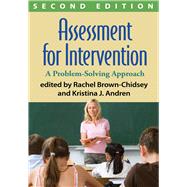Problem-solving assessment is an essential component of multi-tiered systems of support such as response to intervention (RTI) and positive behavioral interventions and supports (PBIS). This authoritative work provides a complete guide to implementing a wide range of problem-solving assessment methods: functional behavioral assessment, interviews, classroom observations, curriculum-based measurement, rating scales, and cognitive instruments. Prominent experts demonstrate the key role of assessment throughout the process of supporting at-risk students, from identifying academic and behavioral problems to planning and monitoring interventions. Several chapters include reproducible forms that can be downloaded and printed in a convenient 8 1/2" x 11" size.
New to This Edition
*Reflects current education policy and best practices.
*Seminal chapter on problem solving by Stanley L. Deno has been updated with a revised model.
*All chapters now discuss assessment in the context of multi-tiered systems of support.
*Chapter on working with culturally and linguistically diverse learners.
*Chapter on graphing student data.
See also Response to Intervention, Second Edition, by Rachel Brown-Chidsey and Mark W. Steege, which provides step-by-step guidelines and practical tools for implementing RTI schoolwide.
New to This Edition
*Reflects current education policy and best practices.
*Seminal chapter on problem solving by Stanley L. Deno has been updated with a revised model.
*All chapters now discuss assessment in the context of multi-tiered systems of support.
*Chapter on working with culturally and linguistically diverse learners.
*Chapter on graphing student data.
See also Response to Intervention, Second Edition, by Rachel Brown-Chidsey and Mark W. Steege, which provides step-by-step guidelines and practical tools for implementing RTI schoolwide.








